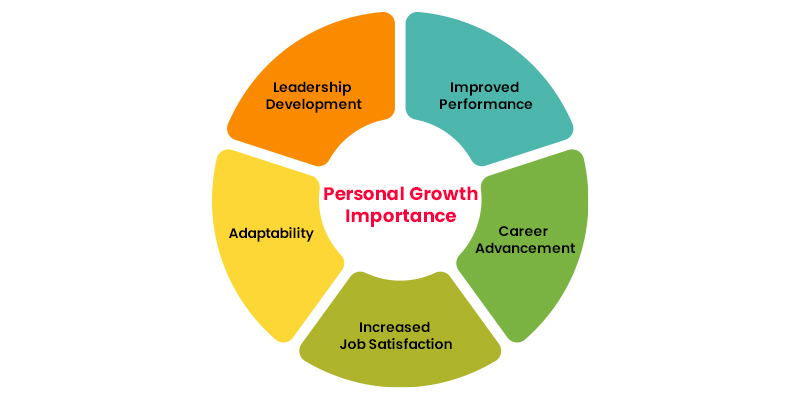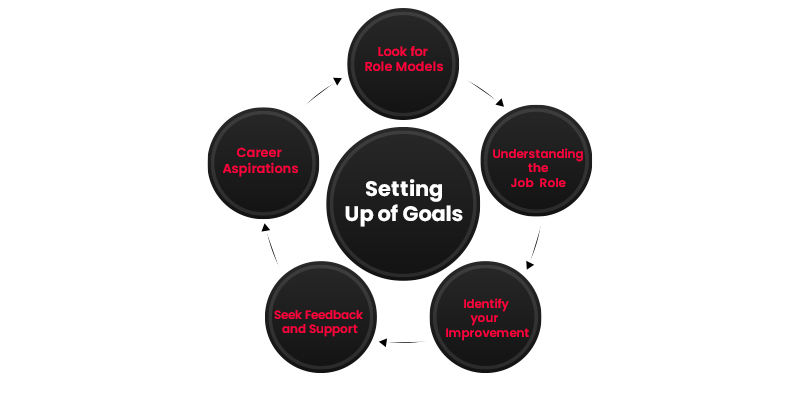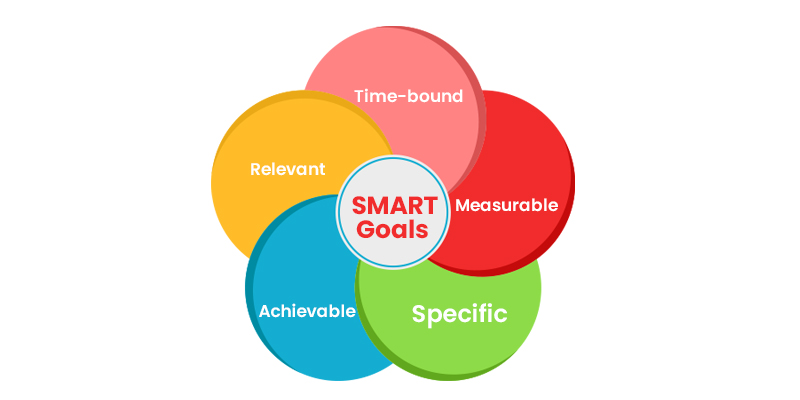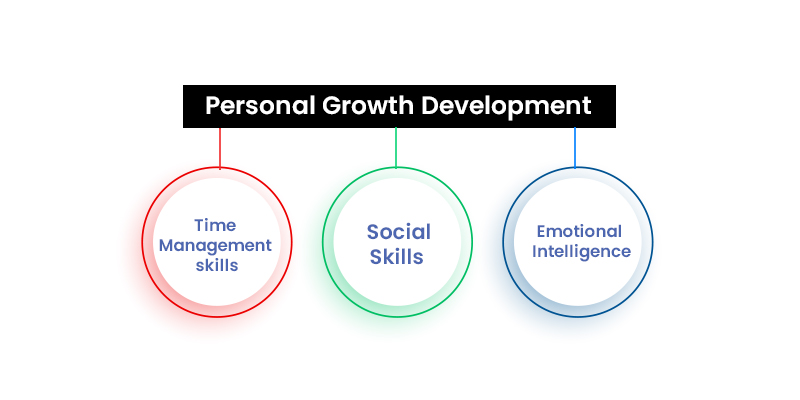In today’s rapidly evolving professional landscape, the importance of continuous professional growth has taken center stage. Improving your Personal growth can lead to a wide range of benefits to professional development. This blog helps graduates seeking freshers jobs to understand the concepts of personal growth and its importance. Additionally, it will equip you with steps to enhance your personal growth journey, enabling you to achieve your aspirations and stand out in your chosen field.

Personal Growth
Personal growth is referred to as an ongoing process of learning and improving one’s skills and abilities. It is all above developing your capabilities not only to enhance your performance in your current role but also for future opportunities and challenges. This transformative process involves a commitment to self-improvement, guided by a willingness to step out of your comfort zone, embrace change, and expand opportunities. Personal development also helps you to meet your Professional goals, like
- Taking on new responsibilities.
- Learning new skills.
- Working towards a promotion.
- Moving into an entirely new job role.
Importance of Personal Growth
Personal growth plays a pivotal role in the workplace and contributes to both individual and organizational success. Here are some points to show why personal growth is vital for professional development:
- Improved Performance: A continuous enhancement in your skills and knowledge will lead you to handle your job responsibilities even better. This can lead to the improvement of job performance and greater productivity.
- Career Advancement: When you focus on personal growth, your chances of getting promotions or other career advancement opportunities will be increased. Employers value candidates who are motivated to learn and grow.
- Increased Job Satisfaction: Gaining new skills and overcoming challenges can lead to increased job satisfaction. You will feel more engaged and motivated when you’re continuously learning and gaining more knowledge.
- Adaptability: In today’s professional environment, changes are a constant. Personality development will guide you to adapt to these changes, learn new technologies, and stay updated in your field.
- Leadership Development: Personal growth includes the development of leadership skills, like good communication, decision-making, and team management. These skills are valuable for a person looking to move into a leadership role.
Hexaware Technologies offers various job opportunities for freshers. Interested candidates can click Hexaware Technologies Jobs For Freshers to look for various job vacancies relevant to their skills and abilities.
Setting Personal Development Goals
Personal Development Goals are very pivotal for job satisfaction and professional growth. Here are some tips on how to get started with setting personal development goals at work.
- Understanding the Job Role: The initial step is to understand your job responsibilities clearly. Analyze the key skills required for your role and your expected tasks. Gaining a comprehensive understanding of your role not only enhances your ability to contribute to your organization but also enables you to identify areas for skill development.
- Identify your Improvement: Always remember to identify the place where you are improving your performance at work. What are your strengths, and how can you improve it more? This could include technical skills as well as soft skills such as communication, leadership, and industry-specific knowledge. If you find any part of your role challenging, set it as a goal to improve yourself and overcome that challenge.
- Seek Feedback and Support: Seek feedback from your superiors, managers, colleagues, and other professional experts. This feedback can provide valuable insights and knowledge about your performance and the industry that you have to focus on. It’s also a very helpful way to know how others value your performance, recognising areas you’re good at or areas that may need you to pay more attention. Share your ideas and development goals with your superiors or other professional experts. They can provide you with the necessary support and resources to achieve your goals. This will also help you develop goals that are relevant to business objectives.
- Career Aspirations: Decide where you want to be in your field in the future, your long-term aspirations, and how will you use short-term goals to achieve them? What skills and educational qualifications will you need to achieve that position? Set goals that are relevant to your career aspirations and lead you to future success.
- Look for Role Models: Another great way of improving your personal development goals is to get inspiration from role models that you want to be like in the future. This can be someone you know or someone who is currently in a position that you want to be in the future, or it can also be a business individual that you admire a lot.
SMART Goals
SMART goals are a helpful way to create goals that you can work on. SMART stands for S-Specific, M-Measurable, A-Achievable, R-Relevant, and T- Time-bound. This approach helps individuals and organizations define goals in a way that increases the chances of success and effective progress. Here’s what each component of SMART goals means.
- Specific: Your goals must be specific and well-defined. You have to know, “What exactly do you want to achieve? Why is it important?”. By being specific, you avoid vague or ambiguous goals that can lead to confusion.
- Measurable: Goals should include clear criteria for measuring progress and success. This will help you to track your development and determine whether you’ve achieved the goal.
- Achievable: Goals should be realistic and attainable. While they are relevant to your abilities, they should also be within reach. It’s important to consider the resources, time, and effort required to achieve the goal.
- Relevant: Your goals must be relevant to your objectives or the organization’s goal. This ensures that your efforts are focused on what truly matters and contributes to your overall success.
- Time-bound: Goal must have a specific time frame or deadline for completion. This adds a sense of urgency and prevents goals from becoming open-ended. Setting a clear timeframe not only provides a target to work toward but also promotes motivation to stay focused and take consistent action.
If you are in search of job vacancies in Chennai, then you can look for job opportunities available in that city. Visit fresher job openings in Chennai to find job roles that are relevant to your skills.
Tips for Developing Personal Growth
Given below are some points to improve your personal development in the workplace.
- Time Management skills: When it comes to a work project, completing it within the deadline is a very important aspect. You have to improve your Time management skills if you want to succeed in your professional journey. If you complete your tasks late, you have to improve on this by focusing on your ability to manage your time. Enhancing your time management skills will result in on-time completion of tasks, career improvement, etc. To begin with, improve your ability to manage time by making sure that you pay conscious attention to your work. Staying alert with your duties will make you a better planner. You will also have better organizational skills that will guide you with how to schedule your tasks accordingly, focusing on the most prioritized tasks and having the discipline to execute them without any interruptions. There are many apps created to help you in managing your time more efficiently and make good use of them.
- Social Skills: Social Skills are a very major aspect of personal growth. If you don’t have a healthy relationship with your workmates, it will reflect on your communication with your team and affect the delivery of work in a negative way. Teamwork is only possible when you have a healthy work relationship with your teammates. Once you create a strong work relationship between you and your colleagues, you’ll benefit from increased performance and a healthier work environment. By completing all your tasks, you can only contribute to the organization. But Team spirit takes you to higher levels for all the areas that require collaboration and promotes a better connection with the workflow of the entire team. This way, you’ll have a good relationship with your colleagues to communicate and learn from them, enhancing your work processes and speed of delivery.
- Emotional Intelligence: Emotional intelligence is a vital aspect of your personality development in your workplace. The ability of understanding and managing emotions is a pivotal skill. Emotional intelligence acts as a tool to acknowledge and handle your own emotions as well as other people’s. It can also help you get to know other people’s motivations and actions. In a workplace, it will be easy for you to improve on your collaboration skills, express yourself even better, and respond to the demands of your relationship with clients and co-workers better. The most efficient way to improve your emotional intelligence is by observing your behavior and reactions while interacting with others. Check out what angers you, inspires, or stresses you. Research what motivates other people, what relieves their stress and inspires them to work better. The result will be a clear perspective on communication and an improved work approach. It will also lead to better listening skills, which boosts your personal growth. You’ll also become a better team player and establish healthier work relationships.
In conclusion, personal growth is not just a self-improvement journey that helps in the improvement of individual aspirations. It is a powerful aspect that leads to success within the workplace. As we’ve explored throughout this blog, personal growth plays an essential role in shaping your career development, which leads to new job opportunities and the overall improvement of the current organization.






